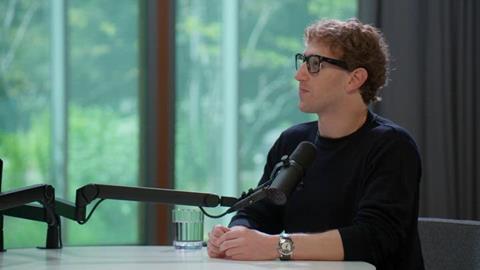Meta CEO Mark Zuckerberg is predicting a future where AI personas will become your “friends”. But innovation strategist James Poulter says AI friendship is a false promise. The model of friendship Jesus gives us is far more meaningful

Mark Zuckerberg has maybe impacted friendship more than any human since Jesus.
Last week he made headlines with his claim about friendship in America and his proposed solution. “The average American has fewer than three friends,” Zuckerberg stated in a podcast interview, “and the average person has demand for meaningfully more. I think it’s something like 15 friends or something.”
His solution? AI companions to fill the gap.
This statement wasn’t just an observation but part of a larger pitch for Meta’s AI strategy.
Zuckerberg envisions a future where our feeds become interactive, where content “talks back” to us, and where AI chatbots become our companions, confidants, and yes — friends.
True friendship requires sacrifice
In John’s Gospel, Jesus tells his disciples: “Greater love has no one than this: to lay down one’s life for one’s friends.” This gets to the heart of the dilemma with AI friends - genuine friendship requires sacrifice. It demands that we place another’s needs above our own, even to the point of self-sacrifice. An AI cannot make this kind of sacrifice because, quite simply, it has no life to give.
While it can simulate concern, provide advice, and even offer a form of companionship, it cannot make authentic sacrifices. It cannot feel the weight of your struggles or the joy of your triumphs. It cannot stay up all night with you when you’re in crisis or embrace you when words fail.
True friendship involves mutual knowledge and genuine disclosure. While an AI can “know” facts about you (often more than we’d like), this isn’t the same as understanding. An AI lacks experiential knowledge — it doesn’t know what it feels like to face rejection, experience grief, or feel ecstatic joy.
Without this shared experiential foundation, can we truly call it friendship?
Solutions to loneliness
But before we throw the AI Bots out with the virtual bath water, there are some areas that need consideration.
Isolation is too real an experience for too many individuals in society, and technology can potentially be a bridge. For immigrants adjusting to new cultures, the elderly with limited mobility, or those in remote areas, AI tools might offer helpful guidance and a form of connection.
But positioning AI as the solution to our “friendship deficit” misunderstands both friendship and loneliness. The loneliness epidemic stems from complex social factors: our increasingly digital lifestyles, fragmented communities, hectic schedules, and the erosion of traditional gathering spaces. Real solutions require addressing these systemic issues, not creating digital substitutes for human connection.
When we go through “the dark night of the soul” - we need genuine human connection. While AI might provide information, even guidance, it cannot provide empathy, love, or care in the way another human can.
AI might simulate these responses, but simulation is not reality.
Zuckerberg explaining how Meta is creating personalized AI friends to supplement your real ones: “The average American has 3 friends, but has demand for 15.” pic.twitter.com/Y9ClAqsbOA
— Roman Helmet Guy (@romanhelmetguy) April 30, 2025
While AI shouldn’t replace human friendship, it can play a valuable role in helping people develop the social skills needed for meaningful human connections. Consider Jonathan Haidt’s research on what he calls “The Anxious Generation.” Haidt argues that Gen Z has experienced a “great rewiring of childhood” where smartphones and social media have dramatically reduced face-to-face interaction, leading to diminished social skills and increased anxiety. Many young people today have had fewer opportunities to practice navigating complex social situations in person.
In this context, AI companions could serve as a low-stakes environment for practising conversation, developing empathy, and working through social anxieties. For someone who struggles with initiating conversations or expressing emotions, an AI conversation partner could help them test approaches and build confidence before engaging with human friends. For immigrants adjusting to new cultural contexts, AI could provide guidance on unfamiliar social norms and expressions.
Haidt emphasises that unsupervised play and real-world social interaction are essential for proper brain development. He notes that when deprived of play, even young animals “don’t develop proper social skills” and remain “much more anxious for the rest of their lives.” While AI cannot replace this crucial real-world experience, it could help bridge gaps for those who need extra support.
The danger comes when we begin to see AI as an easier, more convenient alternative to the sometimes messy, challenging work of human friendship.
As Zuckerberg suggested, many might prefer the predictability and ease of AI companions over the unpredictability of human relationships. But that path leads to further isolation, not connection.
Friendship beyond transaction
Throughout the Gospels, Jesus demonstrates that true friendship isn’t transactional. It isn’t a relationship maintained purely for mutual benefit or problem-solving. Rather, it’s fundamentally self-sacrificial - a willingness to give without expectation of return. This is the model Jesus provides when he tells his disciples, “Greater love has no one than this: to lay down one’s life for one’s friends.”
The reality is that we cannot truly sacrifice ourselves for an AI, nor should we desire to. An AI cannot receive or appreciate our sacrifice in any meaningful way. No matter how many pleases and thank yous you give to ChatGPT or Gemini, “they” cannot experience gratitude, or reciprocate with sacrificial love of its own.
Jesus demonstrates that true friendship isn’t transactional
Loneliness is a real problem, one we cannot shy away from, but leaving it in the hands of our ever so polite chatbots surely isn’t the solution we want.
Friendship, true friendship, is a messy, meandering and mistake-laden enterprise — but it’s also our highest calling — to love one another as we would love ourselves — and I don’t know about you — but I want that from a living, breathing, messy, human friend — created in the image of the one who is love.


































No comments yet